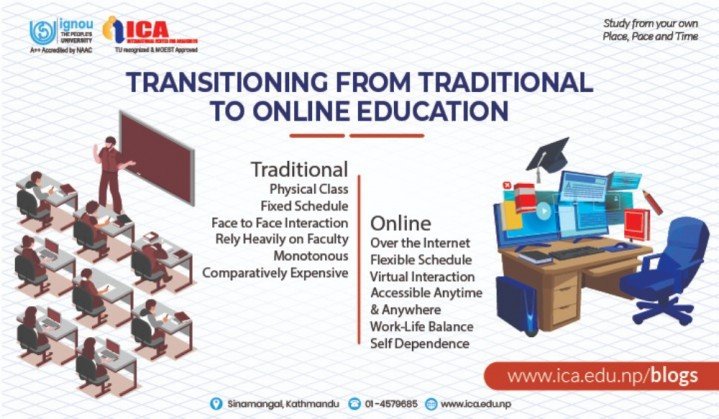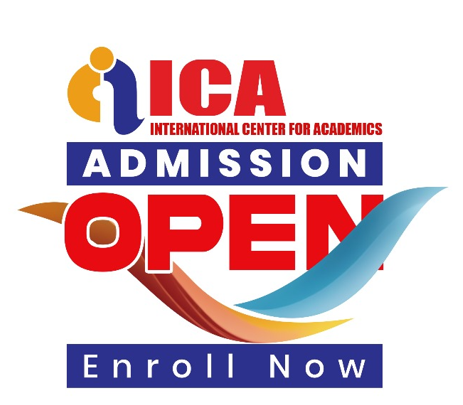
Transitioning from Traditional to Online Education: A Guide for Students
Transitioning from traditional to online education might be scary. Does it really work? Is it really worth it? Is it going to be accepted or accredited? These are common questions in the minds of students who wish to make the switch. Whatever maybe your queries or confusions, we have tried to clear it out for you.
Choosing the Right Place of Study: There are numerous online study platforms available nowadays. Unlike before, online education is being delivered and accepted by top notch universities across the globe. However, it is essential for students to choose from the variety of options firstly regarding the course of study and secondly statutory and other requirements about institutions. These include prospects for accreditation at your home country. For instance, International Center for Academics (ICA) is an authorized IGNOU study center in Nepal and is fully accredited by Tribhuvan University and Ministry of Education, Science and Technology (MOEST)l. Do not fall prey to scam and false information regarding the institution of your choice. It is really important.
Planning your Online Study Journey: Transitioning from traditional to online modes of learning may not be easy at first. It is important to plan your schedules, lectures, and learning pace beforehand. Since online courses are accessible anytime and anywhere according to the student’s convenience, it is important to plan on time that your schedule complies with the course work, assignment deadlines and examinations. It is advisable to visit online study centers (in case of IGNOU, the authorized study center is the International Center for Academics (ICA) to help you plan your online study journey smoothly.
Adapting to Technology: Most online degrees are delivered via online platforms and networking. Some may also implement a mixed module. Whatever the case it is necessary for learners to learn basic technological platforms such as Learning Management Systems (LMS), video and tele-conferencing platforms such as Teams, Zoom, etc. make sure you have access to the internet because most online degrees have internet access as basic requirements.
Creating a Peer Circle: Just like you others are also not fully acquainted with the transitioning from traditional to online methods of learning at the very beginning. It is really helpful to be associated with peer circles, forums and support groups related to online learning. This helps new learners to be acquainted with the terminologies, modules, processes and FAQs related to online education. Forum discussions help new learners to adapt easily to the transition from traditional to online learning methods
Communicating with Tutors: Most online education institutions have dedicated faculty whose primary objective is to provide online and sometimes (offline/physical) guidance to students regarding the subject matters. Without these guides you may feel lost or out of track during your Online and Distance Learning (ODL) journey. Students should not hesitate to raise their concerns about the study matter with tutors and guides. The tutors are more than happy to be at your assistance.
Staying on Top of the Game: Schedules, assignments, deadlines and notices are usually communicated via online sources. It is important for learners to stay in the loop of communication. Similarly staying updated with the online modules of learning is needed. Unlike traditional modules, online modules rely heavily on online communication and updates. Make sure you stay updated about your course requirements at all times.
Defining Your Goals and Aspirations: Just like traditional courses, online courses are designed to grant you your desired degree after completion of the courses. It is important to keep your morale and focus high during your ODL journey. Sometimes, pressing deadlines and tight schedules mixed with personal and professional milestones might take a toll on you. It is important to choose the right subject matter that related to your personal goals and aspirations so that you come out with flying colors.
Access Online Resources: There are numerous online and e-resources available for learners to help them guide through their coursework. These include e-books, e-library systems, podcasts, video and audio materials, Youtube links, and radio links. These resources assist learners to have a clear grasp of the syllabus and subject matter. Make sure you browse through past questions, assignment samples and numerous e-resources made available to you by your university or study center.
Evaluate your progress: Online degrees provide online submission and grading platforms. Tutor marked assignments are graded and feedback is provided online via LMS and personal login systems. You can engage in communication about your evaluation and make a self-assessment of your grades and competencies in subject matter. This is important to support constructive learning and performance improvements. Grading is usually open and easily visible at all times so there is much less chances of ambiguity and confusion. It is advisable to make full use of this power of online learning.
The transition from traditional to online form of education is a continuous process and it required adapting to technological and systemic shifts from time to time. The online approach may be confusing and straining at first but once you embrace the beauty of studying from your own pace, place and time, you will enjoy the journey much more than traditional form of education.
Why think much, enroll in the state of the art online courses at ICA @ IGNOU NOW.
 01- 4579685/ 4583902/ 4578471/ 4591485
01- 4579685/ 4583902/ 4578471/ 4591485 support@ica.edu.np
support@ica.edu.np
 9818505224
9818505224


